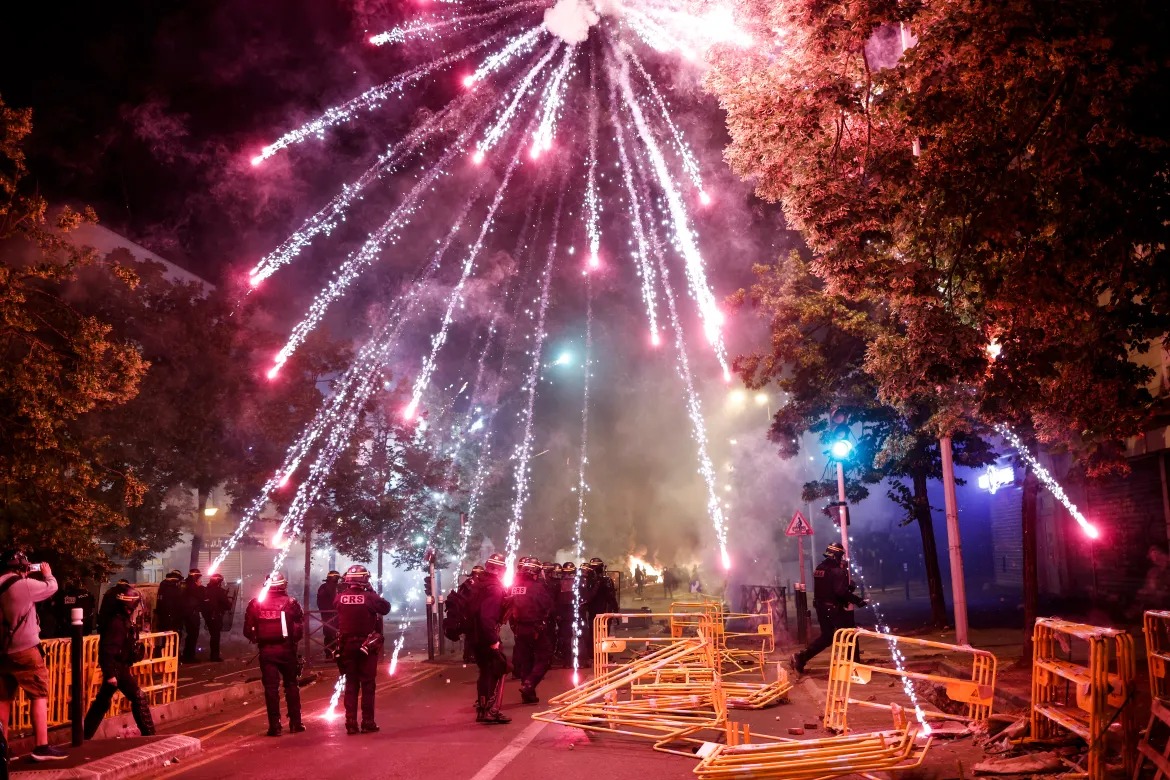Police shooting of teenager sparks protests in France

On June 27, 2023, a 17-year-old boy named Nahel M. was shot and killed by police in the Paris suburb of Nanterre. The killing sparked protests in Nanterre and other cities across France, with clashes between protesters and police. The protesters are demanding that the police officers who killed Nahel be held accountable for their actions, and that an independent investigation into Nahel’s death be conducted. They are also calling for an end to police brutality against Black people and other marginalized communities.
 On June 27, 2023, a 17-year-old boy named Nahel M. was shot and killed by police in the Paris suburb of Nanterre.
On June 27, 2023, a 17-year-old boy named Nahel M. was shot and killed by police in the Paris suburb of Nanterre.What happened?
On Tuesday, June 27, 2023, a 17-year-old boy named Nahel M. was shot and killed by police in the Paris suburb of Nanterre. The police said that Nahel was driving a stolen car and that he had refused to stop when they tried to pull him over. They said that he reached for a weapon in the car, and that one of the officers fired in self-defense. However, witnesses disputed the police account, saying that Nahel was unarmed and that he had been shot in the back.
What followed?
The killing of Nahel sparked protests in Nanterre and other cities across France. On the first night of protests, on Wednesday, June 28, there were clashes between protesters and police. Cars were burned, stores were looted, and several police officers were injured. The protests continued on Thursday, June 29, and Friday, June 30. On Friday, nearly 900 people were arrested across France.

What are the demands of the protesters?
The protesters are demanding that the police officers who killed Nahel be held accountable for their actions. They are also calling for an independent investigation into Nahel’s death. Protesters are calling for an end to police brutality against Black people and other marginalized communities. They are demanding that the police undergo training on implicit bias and de-escalation techniques. At last they are calling for more investment in the working-class neighborhoods where Nahel lived. They are demanding that the government provide more resources for education, healthcare, and job training.
How is the government responding?
The government has condemned the violence and has vowed to investigate the killing of Nahel. However, President Emmanuel Macron has also warned that he will not tolerate “the spread of violence and disorder.” He has deployed thousands of police officers to the streets of Paris and other cities. In addition, the government has banned all “large-scale events” in France and has ordered a nationwide shutdown of public transportation from 9pm to 6am.
The government’s response has been met with mixed reactions. Some people have praised the government for taking a tough stance on the violence, while others have criticized the government for deploying so many police officers and for banning public gatherings.
What is the future of the protests?
The future of the protests in France is unclear. However, the anger and frustration that has been building in the country’s working-class neighborhoods is likely to persist for some time. This could lead to further protests, strikes, and other forms of unrest.
The protests in France are a reminder of the deep divisions that exist in the country. They are also a sign of the growing mistrust between the police and minority communities. It remains to be seen how the government will respond to the protesters’ demands, but the situation is clearly volatile and could escalate in the coming days and weeks.

- Art
- Causes
- Best Offers
- Crafts
- Dance
- Drinks
- Film
- Fitness
- Food
- Games
- Festival
- Gardening
- Health
- Home
- Literature
- Music
- Networking
- Other
- Party
- Religion
- Shopping
- Sports
- Theater
- Wellness



